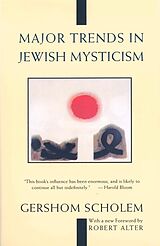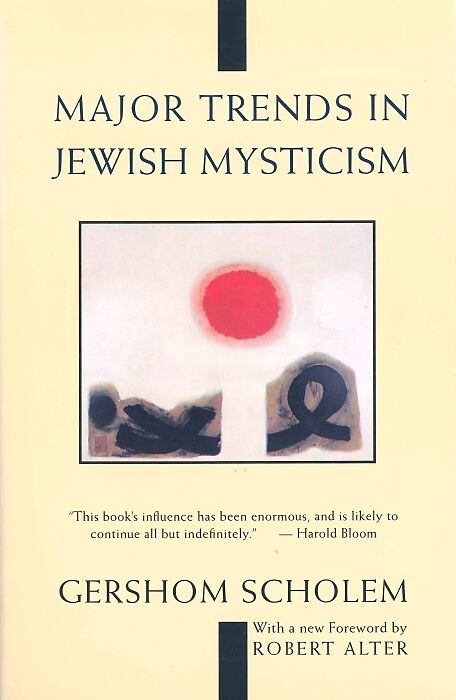Major Trends in Jewish Mysticism
Einband:
Kartonierter Einband
EAN:
9780805210422
Untertitel:
Englisch
Genre:
Religion & Theologie
Autor:
Gershom Scholem
Herausgeber:
Knopf Doubleday Publishing Group
Auflage:
Revised edition
Anzahl Seiten:
496
Erscheinungsdatum:
02.05.1995
ISBN:
978-0-8052-1042-2
Zusatztext "A crucially vital work in the long history of Jewish esoteric spirituality. Aside from its intrinsic importance! the book's influence has been enormous! and is likely to continue all but indefinitely. As much as the stories and parables of Kafka! Scholem's work helped inaugurate Jewish gnosticism on our era." Harold Bloom! Yale University "Over fifty years ago! Major Trends struck the scholarly world like a bombshell! marking the beginning of a new era. The book's unique combination of philological erudition! phenomenological penetration! and synthetic sweep not only wrought a revolution in Jewish studies but also established Jewish mysticism as a major phenomenon in the general history of religions." R.J.Z. Weblowsky! Hebrew University "As the Zohar is the canonical text of the Kabbalah! so! in a sense! is Scholem's Major Trends the canonical modern work on the nature and history of Jewish mysticism. For a sophisticated understanding! not only of the dynamics of Jewish mysticism! but of the exquisite complexities of Jewish history and tradition! Major Trends is a major port of entry through which one must pass." Yosef Hayim Yerushalmi! Columbia University Informationen zum Autor Gershom Scholem Klappentext A collection of lectures on the features of the movement of mysticism that began in antiquity and continues in Hasidism today. First Lecture GENERAL CHARACTERISTICS OF JEWISH MYSTICISM I It is the purpose of these lectures to describe and to analyse some of the major trends in Jewish mysticism. I cannot of course hope to deal comprehensively in a few hours with a subject so vast and at the same time so intricate as the whole sweep and whirl of the mystical stream, as it runs its course through the movements which are known to the history of Jewish religion under the names of Kabbalah and Hasidism. Probably all of you have heard something about these aspects of Hewish religion. Their significance has been a matter of much dispute among Jewish scholars. Opinion has changed several times; it has fluctuated between the extremes of hostile criticism and condemnation on the one hand, and enthusiastic praise and defense on the other. It has not, however, greatly advanced our knowledge of what may be called the real nature of mystical lore, nor has it enabled us to form an unbiased judgment as to the part this lore has played and continues to play in Jewish history, or as to its importance for a true understanding of Judaism. It is only fair to add that the exposition of Jewish mysticism, or that part of it which has so far been publicly discussed, abounds in misunderstandings and consequent misrepresentations of the subject matter under discussion. The great Jewish scholars of the past century whose conception of Jewish history is still dominant in our days, men like Graetz, Zunz, Geiger, Luzzatto and Steinschneider, had little sympathyto put it mildlyfor the Kabbalah. At once strange and repellent, it epitomized everything that was opposed to their own ideas and to the outlook what they hoped to make predominant in modern Judiasm. Darkly it stood in their path, the ally of forces and tendencies in whose rejection pride was taken by a Jewry which, in Steinschneider's words, regarded it as its chief task to make a decent exit from the world. This fact may account for the negative opinions of these scholars regarding the function of mysticism in Jewish history. We are well aware that their attitude, so far from being that of the pure scholar, was rather that of the combatant actively grappling with a dangerous for who is still full of strength and vitality; the foe in question being the Hasidic movement. Enmity can do a great deal. We should be thankful to those zealous early critics who, though their own judgment and sense of values many have been affected and warped by their prejudices, neve...
Autorentext
Gershom Scholem
Klappentext
A collection of lectures on the features of the movement of mysticism that began in antiquity and continues in Hasidism today.
Leseprobe
First Lecture
GENERAL CHARACTERISTICS OF JEWISH MYSTICISM
I
It is the purpose of these lectures to describe and to analyse some of the major trends in Jewish mysticism. I cannot of course hope to deal comprehensively in a few hours with a subject so vast and at the same time so intricate as the whole sweep and whirl of the mystical stream, as it runs its course through the movements which are known to the history of Jewish religion under the names of Kabbalah and Hasidism. Probably all of you have heard something about these aspects of Hewish religion. Their significance has been a matter of much dispute among Jewish scholars. Opinion has changed several times; it has fluctuated between the extremes of hostile criticism and condemnation on the one hand, and enthusiastic praise and defense on the other. It has not, however, greatly advanced our knowledge of what may be called the real nature of mystical lore, nor has it enabled us to form an unbiased judgment as to the part this lore has played and continues to play in Jewish history, or as to its importance for a true understanding of Judaism.
It is only fair to add that the exposition of Jewish mysticism, or that part of it which has so far been publicly discussed, abounds in misunderstandings and consequent misrepresentations of the subject matter under discussion. The great Jewish scholars of the past century whose conception of Jewish history is still dominant in our days, men like Graetz, Zunz, Geiger, Luzzatto and Steinschneider, had little sympathy—to put it mildly—for the Kabbalah. At once strange and repellent, it epitomized everything that was opposed to their own ideas and to the outlook what they hoped to make predominant in modern Judiasm. Darkly it stood in their path, the ally of forces and tendencies in whose rejection pride was taken by a Jewry which, in Steinschneider’s words, regarded it as its chief task to make a decent exit from the world. This fact may account for the negative opinions of these scholars regarding the function of mysticism in Jewish history. We are well aware that their attitude, so far from being that of the pure scholar, was rather that of the combatant actively grappling with a dangerous for who is still full of strength and vitality; the foe in question being the Hasidic movement. Enmity can do a great deal. We should be thankful to those zealous early critics who, though their own judgment and sense of values many have been affected and warped by their prejudices, nevertheless had their eyes open to see certain important factors with great distinctness. Often enough they were in the right, though not for the reasons they themselves gave. Truth to tell, the most astonishing thing in reading the works of these critics is their lack of adequate knowledge of the sources or the subjects on which in many cases they ventured to pass judgment.
It is not to the credit of Jewish scholarship that the works of the few writers who were really informed on the subject were never printed, and in some cases were not even recorded, since there was nobody to take an interest. Nor have we reason to be proud of the fact that the greater part of the ideas and views which show a real insight into the world of Kabbalism, closed as it was to the rationalism prevailing in the Judaism of the nineteenth century, were expressed by Christian scholars of a mystical bent, such as the Englishman Arthur Edward Waite of our days and the German Franz Josef Molitor a century ago. It is a pity that the fine philosophical intuition and natural grasp of such students lost their edge because they lacked all critical sense as to historical and philological data in this field, and therefore failed completely when they had to handle problems bearing on the facts.
The n…

Leider konnten wir für diesen Artikel keine Preise ermitteln ...
billigbuch.ch sucht jetzt für Sie die besten Angebote ...
Die aktuellen Verkaufspreise von 6 Onlineshops werden in Realtime abgefragt.
Sie können das gewünschte Produkt anschliessend direkt beim Anbieter Ihrer Wahl bestellen.
Loading...
Die aktuellen Verkaufspreise von 6 Onlineshops werden in Realtime abgefragt.
Sie können das gewünschte Produkt anschliessend direkt beim Anbieter Ihrer Wahl bestellen.
| # | Onlineshop | Preis CHF | Versand CHF | Total CHF | ||
|---|---|---|---|---|---|---|
| 1 | Seller | 0.00 | 0.00 | 0.00 |
